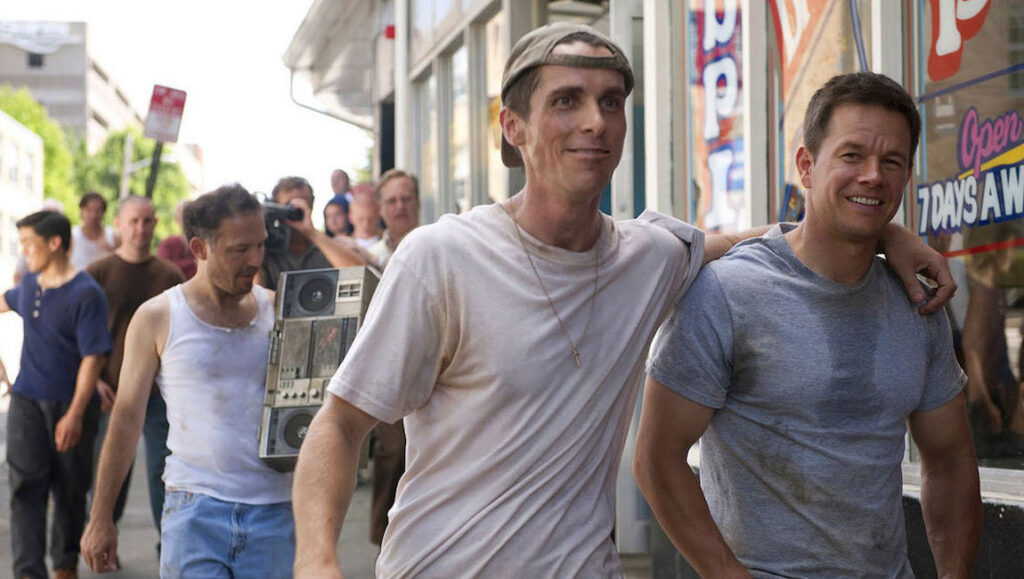Boxing is a sport dependent on mental strategy, despite what its surface-level brutality suggests. In The Fighter, the physically tough but emotionally stricken welterweight boxer “Irish” Mickey Ward (Mark Wahlberg) has a simple plan and sticks to it despite all odds. Mickey takes a lot of punches, wearing down superior opponents by surviving their pummeling blows to the head and torso. Broken, bloodied, and counted out by all (even those pesky HBO analysts), Ward takes advantage of his rival’s draining strength with one perfectly timed blow, gaining you guessed it, unimaginable victory. David O’Russell’s dramatic biopic about Ward and his troubled family asks the viewer to sustain countless melodramatic punches as well, spending most of the story embroiled in Mickey’s scuffles with his cracked-out trainer brother Dickey Eklund (Christian Bale) and their manipulative loon of a mother Alice (Melissa Leo). But this tiresome rope-a-dope never pays off, and even when Ward relishes in sweet professional and romantic victory, the sour taste of cartoonish cliche lingers throughout every redemptive moment.
To call The Fighter a boxing movie, or even a sports film, is problematic at best and ridiculously inaccurate at worst. Wahlberg (who spent years getting this passion project made) and O’Russell make a point of sidestepping the intricacies of sport, the detailed preparation, precision, and practice of boxing, for the many personal distractions plaguing Mickey’s career as a fighter. Beginning with a botched fight in Atlantic City that blatantly showcases Dickey and Alice’s selfish motivations, The Fighter establishes Mickey’s familial plight and his inability to defend himself against the sly vipers slithering through his own family tree. It’s only when Mickey meets local barmaid Charlene (Amy Adams) that he begins to realize the gravity of his situation, and the fact his dreams are being siphoned off by greedy kin. Of course, a strong outside presence immediately rocks Dickey and Alice’s boat, sending each into protection mode, both through passive-aggressive assaults and literal ones (the throwdown between Charlene and Mickey’s coven of gnarly sisters).
The tension between Mickey and Dickey stems from a lifelong degenerative pattern of competition and jealousy punctuated by their abrasive mother and manager, Alice. A former boxer himself, Dickey fought against Sugar Ray Leonard and famously “knocked him down,” giving the now-skeletal man endless bragging rights with local townies and sleazeballs. When Dickey gets sent to prison early on, he’s forced to address his drug habit and negative impact on Mickey’s success. This moment of clarity comes while Dickey and his prison mates watch a documentary on Eklund covering not his boxing career, but the debilitating crack addiction. As Bale’s cavernous face changes from proud shit-talker to embarrassed junkie, The Fighter finally manages some depth of character. But most of these tensions and conflicts rarely amount to anything substantial, and the relationship between both men and Alice is even more hackneyed. Leo’s gut-busting performance is so laughably over the top that the smaller, more meditative moments she shares with her sons feel forced, even falsified in some way.
Patterns of self-preservation persist throughout The Fighter, as each character jockeys for Mickey’s attention despite their best intentions. Charlene begins as a tough-as-nails entity, but loses her muster as soon as Mickey’s success begins to take root. Adams, usually a stellar player no matter the project, looks lost throughout the latter half, caught between a well-meaning brute like Mickey and his fire-breathing family constantly trying to burn down the gates. The result of all these verbal battles is equivalent to a forced therapy session where all parties decide to yell and scream instead of listening thoughtfully. Not only does this wear down Mickey’s resolve, it tests the patience of the viewer yearning to feel an emotional connection with these people. To make matters worse, the actual boxing scenes (shot on Betacams to attain the shoddy image quality of the time) are some of the dullest put to film. As Mickey rests against the ropes taking punch after punch, O’Russell’s camera waits for one moment of physical prowess that comes far too late. We are supposed to glean Mickey’s emotional determination from these physical moments, but no visual or audible approach separates one from another, and each feels like an exercise in futility as opposed to triumph.
Poised to be an Oscar contender for its scenery-chewing performances and underdog perseverance, The Fighter is a messy, flummoxed tale of redemption and brotherly love. Only during the film’s final moments of emotional sincerity, when Dickey and Mickey sit side by side for one last interview, does the film attain any sort of resonance toward their relationship as full-fledged characters. For one brief second, Dickey suspends his rapid-fire banter and looks at Mickey with admiration and regret, giving a flicker of Bale’s genius as an actor and the possibility of a great performance. But it’s too little too late, and one can’t help but see The Fighter as a toothless examination of the blue-collar experience and the role of boxing in shaping a community. For most of the film, these pinball characters bounce off each other randomly and haplessly, yearning for a director and script to ground them in something other than melodrama. This never happens, and inevitably The Fighter proves that silly cartoons aren’t always animated.


Comments are closed.